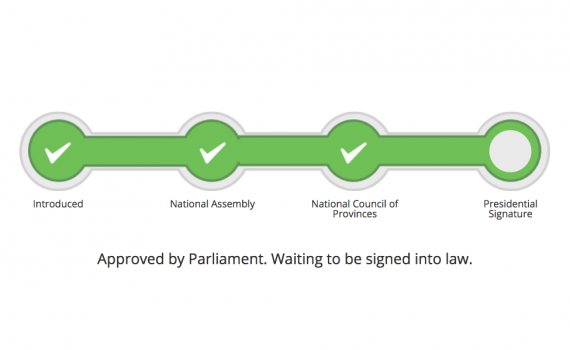
In a letter to Cyril Ramaphosa, President of the Republic of South Africa, EIFL has urged the President to sign into law the new Copyright Amendment Bill [B13F - 2017] without further delay.
The Bill, amending the 1978 Copyright Act, was approved by both Houses of Parliament on 29th February 2024, and sent to the President for assent. The Bill introduces new exceptions for libraries, education and people with disabilities, and it brings copyright rules in South Africa into the digital age.
With a general election taking place in South Africa in May 2024, the clock is ticking for the process to be completed before the elections.
The most scrutinized copyright bill in the world
The Copyright Amendment Bill was first introduced in the National Assembly more than seven years ago. Since then, over 80 official activities and events have taken place in an open and democratic process - public consultations, engagements with stakeholders, technical expert inputs, legal briefings, consideration of additional legislative submissions - making it one of the most scrutinized copyright bills in the world.
In addition, an earlier version of the Bill [B13B - 2017], passed by Parliament in 2019, was returned unsigned by the President citing reservations about the constitutionality of the process and certain sections of the Bill. (The rejection was widely seen as the result of pressure by copyright industries opposed to the Bill, amid the threat of trade sanctions and reduced future investment from the United States and the European Union).
In 2020, Parliament duly addressed the procedural matters (the Bill additionally went before the provincial legislatures), and the National Assembly reconsidered the issues concerned (such as compliance of certain exceptions with international treaties). The current Bill, as adopted, contains minor amendments from the previous version.
The apartheid-era Copyright Act can no longer stand still
As the pre-internet, apartheid-era Copyright Act approaches half a century, the law can no longer stand still. While the multinational corporations and other vested interests who benefit from the copyright status quo in South Africa vigorously oppose change, it is time to move forward for the benefit of all the people of South Africa.
The Bill strengthens the rights of individual creators to ownership and management of their works. It addresses transparency in the collective management of rights and the distribution of royalty payments to artists. It supports online teaching and learning (highlighted during the COVID-19 pandemic), enables libraries and other cultural heritage institutions to preserve South Africa's rich creative expression for future generations, and safeguards from floods and fires (highlighted by the UCT Jagger Library fire in 2021: due to copyright barriers, some items that were destroyed had no digital backups), and it boosts library services to persons with print disabilities (highlighted by the ruling of the Constitutional Court that sections of the Copyright Act are unconstitutional because they discriminate against blind and visually impaired people).
The clock is ticking
South Africans will go to the polls on 29 May 2024 to elect a new National Assembly, which will then choose the next President. It is vital that President Ramaphosa signs the Copyright Amendment Bill before his current term ends in order to avoid further lengthy delays or even scuppering the Bill entirely. At stake is the credibility of the copyright system in serving education, research and society in the digital age, and the ability of policymakers and politicians to deliver fair and balanced copyright laws for all their people.
Further reading
- EIFL’s letter to President Cyril Ramaphosa. March 2024.
- South Africa’s Copyright Bill: don’t let the schedule slip
- EIFL delivers comments on SA’s Copyright Bill
SHARE / PRINT









